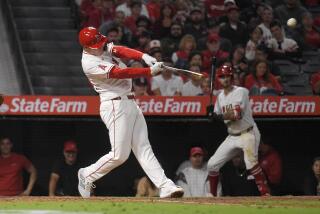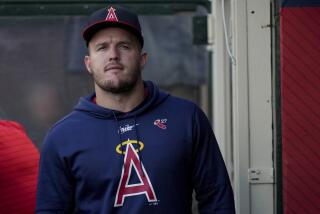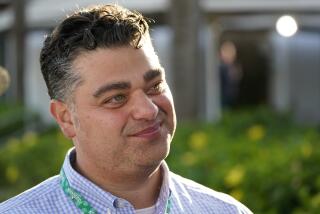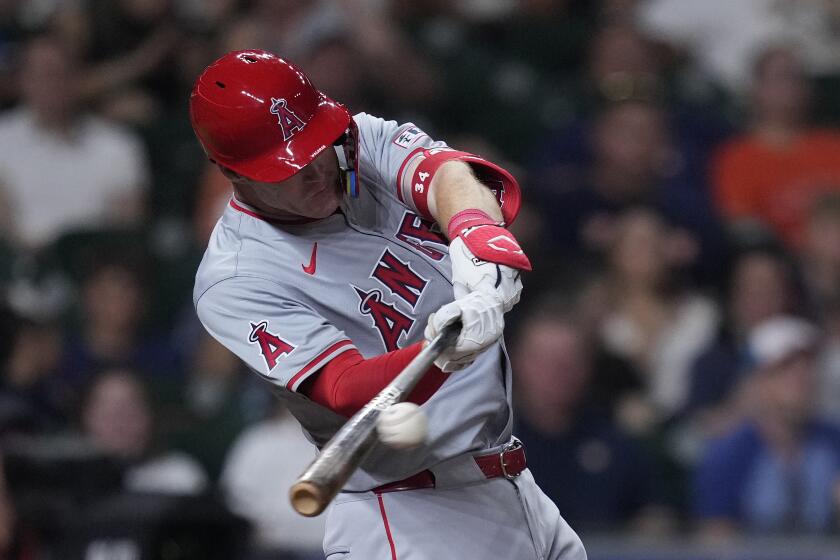BAD NEWS BEARERS
Managers are always expecting the unexpected phone call.
The call that will relay news that a player is hurt, that a trade is about to be made or, as Joe Torre of the Dodgers likes to sometimes kid, that they’ve been fired.
But what could prepare Angels Manager Mike Scioscia for the call he received last month, telling him the unthinkable -- that rookie pitcher Nick Adenhart was dead?
“There is no template, no instruction manual for dealing with what has happened,” Scioscia said.
For Torre, the call he got two weeks ago carried no such tragic consequences but created shockwaves nonetheless. Manny Ramirez, the player who carried the Dodgers to the playoffs last fall, would be the first star player suspended for violating baseball’s drug policy.
While the content of the crises is sharply disparate, each manager had to confront a difficult situation -- for Scioscia one that can’t be compared. But it is possible to learn, in some small way, how unforeseen events are handled by these two men considered by many to be two of the best managers in baseball.
In the midst of turmoil, they have managed to keep their teams afloat, even thrive at times.
The Angels, who lost 13 of their first 22 games, are 21-19 and tonight begin the latest three-game installment of the Freeway Series only two games behind the Texas Rangers in the American League West.
The Dodgers, who had the best record in the majors when Ramirez was handed a 50-game ban, remain baseball’s best team at 29-13 and are nine games ahead of San Francisco in the National League West.
Ramirez is due back on July 3, meaning the Dodgers will be back at full strength after 37 more games.
For the Angels, the situation is much more complicated. No matter how many games they win, they’ll never be the same. “It was a nightmare,” Scioscia said of Adenhart’s death. “We’re in the process of resetting. There’s not a magic moment where you’re back to normal. We think about Nick every day.”
The Angels were three games into the season when their world was shattered by the death of the 22-year-old Adenhart, who was killed in a traffic accident early on April 9, hours after throwing six shutout innings against the Oakland Athletics at Angel Stadium.
While Adenhart’s agent, Scott Boras, cried at a morning news conference, Scioscia kept his emotions in check as he talked about how proud he was of Adenhart’s growth as a player and a person and how proud Adenhart’s parents should be.
Later that afternoon, the Angels gathered in their clubhouse for a heart-wrenching meeting in which Adenhart’s father, Jim, addressed the team. Scioscia also spoke, and though he declined to discuss specifics, he has remained steadfast in his message:
This isn’t about how the Angels cope. It’s about Adenhart’s parents and family, and how nothing the Angels will endure can compare with the devastation of losing a child. And if you want to honor Adenhart, do it by playing good, hard, winning baseball. Let the field be your haven.
The Angels took the message to heart. “He handled the situation with Nick as professionally as you can,” center fielder Torii Hunter said of Scioscia. “He showed a lot of respect for Nick and his family. He kept motivating us and trying to keep smiles on our faces, yet, he was having a hard time himself. He just didn’t want all the players to really see what he was going through.”
Said pitcher Joe Saunders: “You could tell inside that he was as shook up as we were, but he was trying to remain as strong as he could. As strong as he was, he kept us strong, too.”
Still, though the Angels won their first game after Adenhart’s death, they struggled to cope, losing five of their next six. It didn’t help that, after losing pitchers John Lackey, Ervin Santana and Kelvim Escobar to injury, the lost their best hitter, Vladimir Guerrero, to a torn chest muscle.
Not until they held a private memorial for Adenhart on their field on April 23 did the Angels begin to get some closure. The team won 11 of its next 16 games.
Meanwhile, the Dodgers were about to get the rug pulled out from under them. Ramirez had let himself be found with abnormally high levels of synthetic testosterone in a drug test he knew he would have to take upon reporting to spring training.
As part of the review process, baseball obtained Ramirez’s medical records and found a prescription for a banned substance. On May 6, Ramirez dropped his appeal and by the middle of the seventh inning of that night’s game, dropped out of sight.
Dodgers owner Frank McCourt since has maintained that he knew nothing of the situation until after the game ended, and that he phoned Torre and General Manager Ned Colletti after midnight to deliver the news. Yet sources with knowledge of the situation, who spoke on the condition of anonymity because they do not have permission to discuss the matter publicly, have said that Torre and McCourt learned of Ramirez’s fate earlier that day.
Either way, the result was the same: The magic was out of Mannywood and Ramirez was out of the Dodgers’ lineup. The next day, it was Torre who took center stage alongside Colletti at a Dodger Stadium news conference, with the veteran manager stoically taking on the toughest questions.
“The first day was a big media mess here,” catcher Russell Martin said. “Joe probably answered every question people had. That probably took a lot of pressure off us. That’s one thing he’s really good at.”
Torre had plenty of practice, having managed the New York Yankees for 12 seasons. In the world’s largest media market, he found himself in the middle of countless controversies, among them a steroid scandal involving Jason Giambi.
“I think you noticed a lot of what popped up there had very little to do with what happened on the field,” Torre said.
But not everyone can protect their team the way Torre does, as third base coach Larry Bowa learned the hard way in his own managerial stints in San Diego and Philadelphia.
“You have to be truthful, but you can’t be too truthful,” Bowa said. “I’m not saying you have to lie, but you can’t say everything you want to say. . . .
“Joe’s real honest, but he knows how to camouflage.”
Not in the clubhouse, though.
“He doesn’t try to ignore the situation,” Martin said. “He explains that it’s normal if you’re thinking a certain way but that you can’t let it distract you.”
Torre also remained calm when speaking to his players. “I find that if I were to make a real big deal of it, there would be a trickle-down effect on the players,” Torre said.
Torre monitored the situation closely. He made it a point to speak individually to Andre Ethier and shortstop Rafael Furcal, whom he thought might be most affected by Ramirez’s absence. And he helped Ramirez work up the nerve to address his teammates in Miami last week.
Perhaps as important was Torre’s way of dealing with players who would be asked to shoulder greater responsibilities -- players such as Juan Pierre, who moved into the starting lineup and bench players Brad Ausmus, Mark Loretta and Juan Castro.
“He treats whoever’s filling in for a regular like he’s a star player,” Bowa said. “They feel that they’re important.”
So far, it has worked.
“Things are going to crop up,” Torre said. “You have to do what you can and make sure that you don’t use excuses.”
--
mike.digiovanna@latimes.com
--
BEGIN TEXT OF INFOBOX
Stat package
Where the Dodgers and Angels rank in key categories in their respective leagues (through Wednesday):
*--* DODGERS ANGELS 29-13 (1st) Record 20-19 (7th) 5.52 (2nd) Runs/game 4.90 (9th) 33 (11th) Home runs 30 (13th) 32 (3rd) Steals 55 (2nd) 192 (1st) Walks 128 (11th) 285 (2nd) Batting avg 281 (2nd) 370 (1st) On base% 343 (8th) 422 (5th) Slug % 410 (11th) 3.64 (1st) ERA 4.60 (8th) 14 (2nd) Saves 11 (t3rd) *--*
More to Read
Go beyond the scoreboard
Get the latest on L.A.'s teams in the daily Sports Report newsletter.
You may occasionally receive promotional content from the Los Angeles Times.







